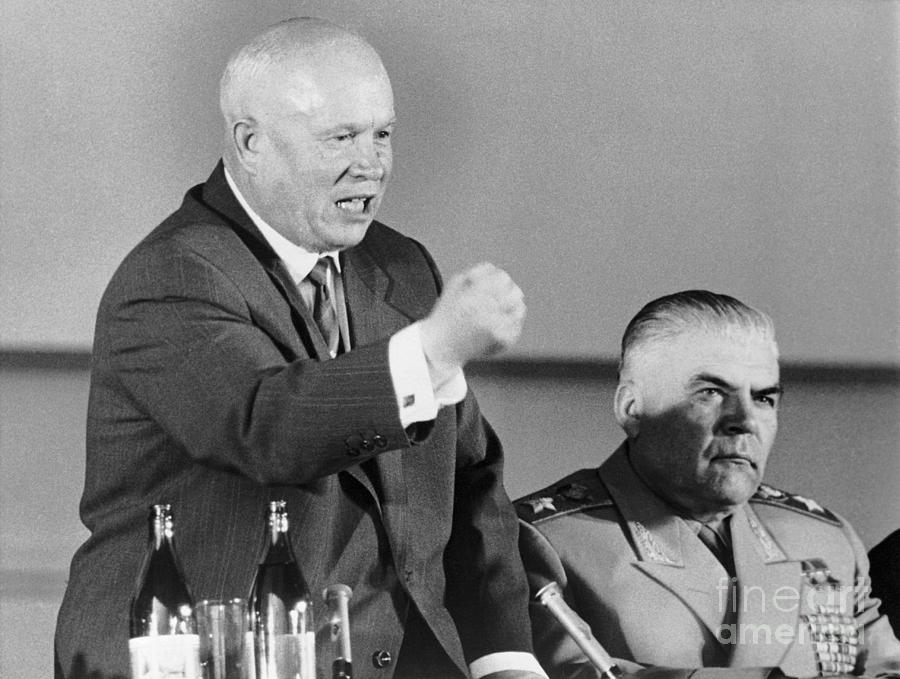Natasha Anguelouch Week #10: Misinterpretation
I recently heard about the misinterpretation of a simple phrase that would be comical if it weren’t so frightening.
It was uttered by Nikita Khrushchev, the First Secretary of the Communist Party and known for his “eccentric outbursts.” He is said to have taken his shoe off and slammed it against a table at an assembly once, and though there is debate as to whether this truly happened, the fact that such contention exists is indicative enough of his personality.
Khrushchev was smart but uneducated and prone to blurting blunt, tasteless things, one of which nearly caused World War III. In 1956 Khrushchev told Western ambassadors that “we [the Soviet Union] will bury you.” This caused global outrage as political leaders misconstrued it as a direct military threat and call to war. Fortunately and unfortunately, their panic was unfounded.
“We will bury you” was simply translated too literally from Russian--the actual phrase has several connotations such as “we will outlast you” and indicated Khrushchev's confidence in the Soviet Union’s technology and historical success more than anything else. Even taken literally, Khrushchev did not seem to have any interest in engaging the West in direct conflict at the time, but these countries’ concern was still justified at such an ominous message.
I personally find it interesting that a phrase that short and arbitrary (to Khrushchev) created such great chaos. Things may have ended in disaster for all had this mistake not been clarified in time. Khrushchev and his interpreter’s blunder indicates the importance of choosing your words carefully, as they have more power than most realize.

.png)

Hi Natasha, I read your blog, and I found your example of the power of misinterpretation to be very insightful. From small misunderstandings to larger scales, false interpretation of information can have costly consequences. To prevent possible risks from occurring, I believe we should all learn how to wield our power of speech and be aware of the effect our words can have.
ReplyDeleteHi Natasha, reading your blog has given me a mini history lesson on a topic I never knew of! It's stunning how just three words from Khrushchev has led to so much outrage, although I admit that I do feel as if it is deserved. A man holding the amount of power that he holds is a man to look up to, yet he used it in a childish way, leading to more chaos than there was to begin with. That's why, I think it's super important to be mindful of our words and the impact it may have on others.
ReplyDeleteHi Natasha, I found your blog very interesting and I learned new things as well. It is amazing to see how a simple mistranslation fueled people's hatred and agitation. This small misunderstanding got blown up on a large scale to the point where people thought it was a call to war. It think that it is really important to try and understand things and learn how to use the power of our speech in a positive and cautious way.
ReplyDeleteHi Natasha,
ReplyDeleteYour blog was extremely interesting. Choosing words is an extremely powerful yet often overlooked part of social interaction. One always has to be wary of misinterpretation, because it can cause disagreements or in extreme cases, war. words are power, it is important how we use them. And equally important that we mean what we say.
Hi Natasha,
ReplyDeleteIt is crazy how such a small phrase caused a large impact on society. I believe that there is a tremendous amount of power of framing. The way that words are said can change the way that people thing. People's interpretations of a particular topic are fueled by the way it is worded. For example, the fundamental phrase we all learn in English: Let's eat Grandma vs. Let's eat, Grandma. Marketers and politicians pay close attention to phrasing when they deliver certain text to the world. They take into account how people may think and take this information.
Hey Natasha, I never knew that this happened. I have to agree that miscommunication is a really big thing that could cause a lot of issues especially with people that hold positions of power misunderstandings are not things that are favorable to those people. This kind of reminds me of the poster in Ms. Benedetti's class that says "let's eat Grandma" v.s. " Let's eat, Grandma. and it is interesting how such things can be turned into twisted versions of themselves if misheard or misinterpreted.
ReplyDeleteHi Natasha,
ReplyDeleteIt is funny how the language barrier between two parties could have had such a massive impact. To think that another world war would have started just because something was translated the wrong way shows the true power of words. I have seen things like this in text messages. For example, someone will say something, but you can not tell tone over text, so you are unsure what they mean. I also wonder if sign language has tones. Usually, tones are displayed through your voice but maybe sign language has its way of showing tone.
Hi Natasha, I thought that your post was an interesting insight into the power of language (and perhaps the power of misinformation, as well). It has always been interesting to me that certain phrases and their connotations can be "lost in translation." The power of language truly is mystifying and I'm glad that it's our job as English students to seek it.
ReplyDelete